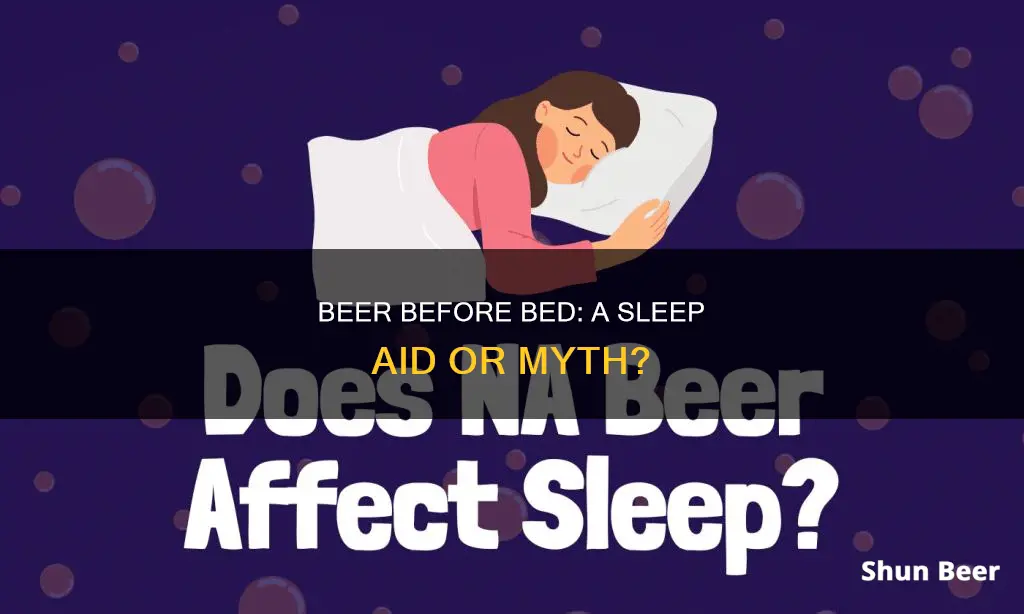
Alcohol is a central nervous system depressant, which slows down brain activity and creates a sedative effect. This can help you fall asleep faster, but it can also negatively impact your sleep quality. Research shows that alcohol reduces REM sleep, which is the deepest stage of sleep and is important for dreaming, learning, and memory processing. It can also cause frequent awakenings, night sweats, more intense snoring, and nightmares. Therefore, while a drink or two may help you relax and fall asleep faster, it can disrupt your sleep later in the night.
| Characteristics | Values |
|---|---|
| Effect on sleep | Alcohol can help people fall asleep faster, but it negatively impacts overall sleep quality. |
| Reasons | Alcohol increases the brain's levels of adenosine, a sleep-inducing chemical. It also relaxes the airway, causing more snoring and worsening sleep apnea. |
| Timing | Alcohol wears off quickly, leading to frequent awakenings. It's recommended to have a minimum of three hours between the last drink and bedtime. |
| REM sleep | Alcohol interrupts REM sleep, which is important for dreaming, learning, and memory processing. |
| Other effects | Alcohol can cause dehydration, leading to headaches. It also has a diuretic effect, resulting in frequent urination during the night. |
| Risks | Regular drinking has been linked to insomnia and other sleep disorders, especially in older adults. |
What You'll Learn
- Alcohol is a depressant and sedative, slowing brain activity and helping you fall asleep faster
- However, it negatively impacts sleep quality, causing more awakenings and lower-quality sleep
- It can also lead to sleep disorders such as insomnia and sleep apnea
- Alcohol affects REM sleep, reducing the most restorative phase of sleep
- It can also cause dehydration, vivid dreams, and parasomnias such as sleepwalking

Alcohol is a depressant and sedative, slowing brain activity and helping you fall asleep faster
Alcohol is a central nervous system depressant, or sedative, that slows brain activity and helps you fall asleep faster. It does this by enhancing the brain's levels of a chemical called adenosine, which can lead to sleepiness.
However, while alcohol can make you fall asleep faster, it can also disturb your sleep as it wears off. This is because, as your body metabolises the alcohol and the sedative effects wear off, it interferes with your circadian rhythm, causing you to wake up frequently or before you are properly rested.
Alcohol also reduces REM sleep in the first half of the night, creating an imbalance in your sleep cycle. This can decrease your sleep quality and may lead to less sleep and more awakenings. REM sleep is the deepest stage of sleep when dreaming occurs. It has a restorative effect and plays a role in memory and concentration. Poor or insufficient REM sleep has been linked to grogginess the next day, as well as a higher risk of disease and early death.
In addition, alcohol can cause dehydration and frequent urination, which can disrupt sleep. It can also increase body temperature, which can lead to sweating and further disrupt sleep.
Beer and Sudafed: Safe Mix or Health Risk?
You may want to see also

However, it negatively impacts sleep quality, causing more awakenings and lower-quality sleep
Alcohol may help you fall asleep faster, but it can negatively impact your sleep quality. It can cause more awakenings and lower-quality sleep, leaving you feeling tired the next day.
Alcohol is a central nervous system depressant, which means it slows down brain activity and has a sedative effect. This can help you relax and make you feel drowsy, allowing you to fall asleep more quickly. However, this effect is short-lived and wears off after a few hours as your body works to eliminate the alcohol from your system.
During sleep, the body typically cycles through four stages, including three non-rapid eye movement (NREM) stages and rapid eye movement (REM) sleep. Alcohol disrupts this sleep cycle by increasing N3 sleep or "deep sleep" and reducing REM sleep in the first half of the night. Later in the night, once the body has metabolized the alcohol, you are likely to experience more N1 sleep, the lightest stage of sleep, leading to frequent awakenings and fragmented sleep.
In addition, alcohol can cause dehydration, leading to headaches and the need to wake up and use the bathroom multiple times throughout the night. It can also increase body temperature, making it harder to get a good night's sleep.
Research has shown that alcohol consumption, even in low amounts, can negatively impact sleep quality. A study by Finnish researchers found that low alcohol intake reduced sleep quality by 9.3%, moderate intake by 24%, and heavy intake by nearly 40%.
To minimize the negative impact of alcohol on sleep, it is recommended to allow at least three to four hours between your last drink and bedtime. Drinking water along with alcohol and consuming alcohol with a meal can also help reduce its disruptive effects on sleep.
Vaccinated and Thirsty: Beer After COVID Vaccine?
You may want to see also

It can also lead to sleep disorders such as insomnia and sleep apnea
Drinking alcohol, including beer, can lead to sleep disorders such as insomnia and sleep apnea. While alcohol can make you feel sleepy initially, it can also negatively impact your sleep quality.
Insomnia is a sleep disorder characterised by difficulty falling or staying asleep. Research has found that heavy alcohol use can contribute to the development of insomnia. As many as three-quarters of people with alcohol dependence experience insomnia symptoms when they drink. Insomnia is also common in individuals going through alcohol withdrawal or early recovery from alcohol addiction.
Alcohol can also worsen existing sleep disorders, such as sleep apnea. Sleep apnea is a disorder characterised by short and frequent cessations of breathing during sleep. Obstructive sleep apnea (OSA) occurs when the tissues in the mouth and throat relax and block the airway during sleep. Alcohol can aggravate OSA symptoms by causing the throat and tongue muscles to relax and increasing airway resistance in the nasal passages. This leads to more frequent and prolonged breathing interruptions during sleep.
Additionally, alcohol can increase the risk of developing sleep apnea. Higher levels of alcohol consumption have been linked to an increased risk for sleep apnea. Therefore, individuals with sleep apnea should pay close attention to their drinking habits before bedtime to optimise their sleep quality.
In summary, while alcohol may initially make you feel sleepy, it can lead to sleep disorders such as insomnia and sleep apnea, disrupting your sleep quality and leaving you feeling tired the next day.
Beer Batters: How Do They Work?
You may want to see also

Alcohol affects REM sleep, reducing the most restorative phase of sleep
Alcohol can indeed help you fall asleep faster, but it will likely disrupt your sleep later in the night. This is because alcohol affects the sleep cycle, particularly the REM stage.
REM sleep is the stage of sleep where rapid eye movements occur, and it is characterised by an increase in breathing and heart rate. It usually occurs about 90 minutes after falling asleep and is the stage when you dream. It is also considered the most restorative phase of sleep, where memories are converted from temporary to a more permanent form.
Alcohol inhibits REM sleep, reducing the most restorative phase of sleep. It can shorten the amount of time spent in REM sleep during the first two sleep cycles and lengthen the amount of time spent in slow-wave sleep. This shift decreases sleep quality, resulting in fewer hours of sleep and more disruptions.
Finnish researchers found that alcohol reduced sleep quality by 9.3% for low intake, 24% for moderate intake, and nearly 40% for heavy intake. Even light alcohol consumption can negatively impact sleep quality.
Beer and Strep Throat: Is It Safe to Drink?
You may want to see also

It can also cause dehydration, vivid dreams, and parasomnias such as sleepwalking
Alcohol can cause dehydration, vivid dreams, and parasomnias such as sleepwalking.
Alcohol is a diuretic, meaning you will need to pass urine more often. This can cause dehydration, which may be the reason for your headache the morning after drinking. It can also cause you to wake up in the night to go to the bathroom, interrupting your sleep.
Alcohol can also cause vivid dreams and parasomnias such as sleepwalking. As your body metabolizes the alcohol, it can interfere with your circadian rhythm, causing you to wake up frequently or before you are properly rested. It increases your chances of having vivid dreams or nightmares, and parasomnias such as sleepwalking and sleeptalking. This is because alcohol increases the amount of slow-wave sleep in the first third of the night, which may precipitate or increase the frequency of parasomnias that occur during this stage of sleep.
Alcohol also affects your body temperature. As it is highly calorific, drinking too much means your body has to burn off these additional calories, increasing your body temperature. To get good sleep, you need to lose approximately 1°C of body temperature throughout the night. But the alcohol in your system prevents you from losing heat, leading to poorer sleep, especially in the second half of the night.
Beer, Chocolate, and Bliss: A Delicious Combination
You may want to see also







